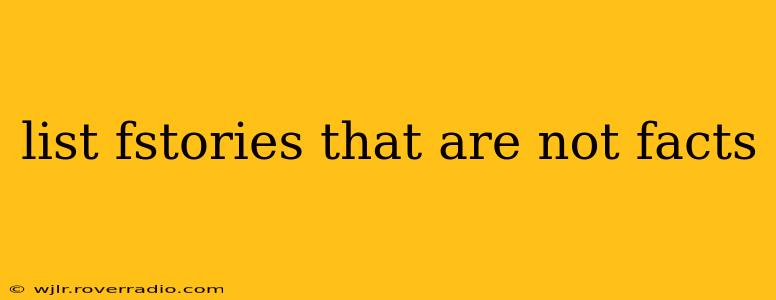Fictional Stories: A World Beyond Reality
This list explores various categories of fictional stories, highlighting their key characteristics and providing examples to illustrate the breadth and depth of the imaginative landscape. These are not factual accounts, but rather products of human creativity and storytelling.
1. Fairy Tales and Folklore: Ancient Narratives of Imagination
Fairy tales and folklore represent some of the oldest forms of fictional storytelling. These narratives often feature magical elements, fantastical creatures, and archetypal characters like heroes, villains, and wise mentors. They frequently explore universal themes such as good versus evil, perseverance, and the consequences of choices.
- Examples: "Cinderella," "Little Red Riding Hood," "Jack and the Beanstalk," various myths from Greek, Norse, and other cultures. These stories, while often adapted, maintain their core elements of fantasy and moral lessons.
2. Myths and Legends: Explaining the Unexplainable
Myths and legends, similar to fairy tales, often incorporate fantastical elements. However, they frequently attempt to explain natural phenomena, historical events, or the origins of cultures. These narratives often feature gods, goddesses, and demigods, who play crucial roles in shaping the world and the lives of mortals.
- Examples: The story of King Arthur and the Knights of the Round Table, the Trojan War, the creation myths of various cultures. These stories, passed down through generations, offer insights into the beliefs and values of their respective societies.
3. Fantasy Literature: Worlds of Magic and Wonder
Fantasy literature builds upon the foundations of fairy tales and myths, creating entirely new worlds with intricate rules, detailed histories, and compelling characters. These stories often involve magic, mythical creatures, epic quests, and complex political intrigue.
- Examples: The works of J.R.R. Tolkien ("The Lord of the Rings"), George R.R. Martin ("A Song of Ice and Fire"), Brandon Sanderson (The Stormlight Archive). These elaborate fictional worlds captivate readers with their immersive settings and compelling narratives.
4. Science Fiction: Exploring the Possibilities of the Future
Science fiction stories explore the potential consequences of scientific advancements, technological innovations, and societal changes. They often envision future worlds, alien civilizations, or alternate realities, prompting readers to contemplate the possibilities and challenges of progress.
- Examples: "Dune" by Frank Herbert, "Foundation" by Isaac Asimov, "The Martian" by Andy Weir. These novels often address ethical dilemmas and social issues within their futuristic settings.
5. Historical Fiction: Imagining the Past
Historical fiction blends factual historical events and settings with fictional characters and narratives. While rooted in historical context, these stories focus on exploring the human experience within specific time periods, offering fresh perspectives on well-known events or lesser-known aspects of the past.
- Examples: "The Nightingale" by Kristin Hannah, "The Book Thief" by Markus Zusak, "Wolf Hall" by Hilary Mantel. These stories immerse readers in past eras, providing a glimpse into the lives and experiences of individuals living during that time.
6. Contemporary Fiction: Stories of Our Time
Contemporary fiction focuses on narratives set in the present day, exploring themes and issues relevant to modern society. These stories may delve into relationships, social dynamics, personal struggles, or broader societal concerns.
- Examples: Works by authors like Chimamanda Ngozi Adichie, Sally Rooney, and many others. These stories reflect current societal trends and the human condition in a contemporary setting.
7. Horror Fiction: Exploring Fear and the Supernatural
Horror fiction aims to evoke fear, suspense, and dread in readers. These stories often involve supernatural elements, psychological thrillers, or gruesome depictions of violence.
- Examples: Works by Stephen King, Shirley Jackson, and H.P. Lovecraft. These stories explore the darkest aspects of the human psyche and often involve terrifying creatures or situations.
This list provides a glimpse into the diverse world of fictional storytelling. Remember, these are all imaginative creations, not factual accounts of events or people. The beauty of fiction lies in its ability to transport us to other worlds, explore different perspectives, and stimulate our imaginations.
